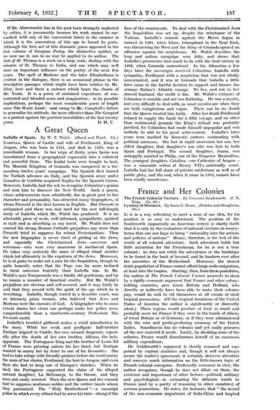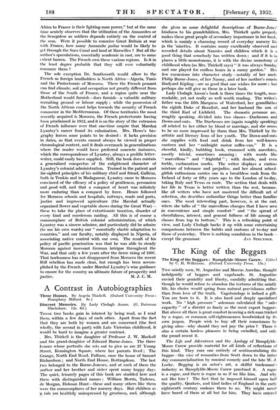France and Her Colonies
IT is in a way refreshing to meet a man of one idea, for his position is so easy to understand. The position of Dr. Southworth (apparently an American writer) is clarity itself: that it is only by the evaluation of national ventures in money. terms that one can hope to bring" rationality into the actions and policies of nations." Money, therefore, is the test of the worth of all colonial adventure. Such adventure holds but little attraction for the Frenchman, for he is not a true colonist ; he does not relish the adventures or the hardships to be found in the back of beyond, and he hankers ever after the amenities of the Motherland. Moreover, the almost static population of France cannot afford large-scale emigration, at least into the tropics. Starting, then, from these postulates, the author of The French Colonial Venture proceeds to show by a rigidly economic argument that France and other colony. holding countries, save Great Britain and Holland, who directly or indirectly have been able to make their colonies pay, would do well to rid themselves at all events of their tropical possessions. (Of the tropical dominions of the United States of America the author is significantly or discreetly silent.) These regions would produce at least as much and probably more for France if they were in the hands of others, of Great Britain or of Germany, or if they were administered with the wise and profit-producing economy of the Dutch Indies. Scandinavia has no colonies and yet easily procures all the raw material it needs. Lastly, by shedding some of the colonies, France would disembarrass herself of an enormous military expenditure.
Dr. Southworth's argument is closely reasoned and sup- ported by copious statistics and, though it will not always secure the reader's agreement, it certainly deserves attention and conveys much information on the little-known topic of French colonial enterprise. Professedly economic in view, the author recognizes, though he does not dilate on them, the existence and importance of other factors—political, military and psychological—in estimating the ultimate worth to France (and by a parity of reasoning to other countries) of oversee possessions. He notes, for instance, that "the kernel of the non-economic importance of Indo-China and tropical Africa to France is their fighting-man power," but at the same time acutely observes that the utilization of the Annamites or the Senegalese as soldiers depends entirely on the control of the seas. Were it possible to conceive Great Britain at war with France, how many Annamite poilus would be likely to get through the Suez Canal and land at Marseilles ? But all the author's speculations, essentially academic in cast, are to some extent barren. The French own these various regions. Is it in the least degree probable that they will ever voluntarily renounce them ?
The sole exception Dr. Southworth would allow to the French as foreign landholders is North Africa—Algeria, Tunis and the Protectorate of Morocco. There the French peasant can find climate, soil and occupation not greatly different from those of the South of France, and a region quite near the Motherland would furnish—does furnish—a valuable military recruiting ground or labour supply ; while the possession of the North African coast helps towards the security of French commerce in the Mediterranean. Of these territories the most recently acquired is Morocco, the French protectorate having been proclaimed in 1912, and it is on the story of the extension of French influence over that one-time empire that Marshal Lyautey's career found its culmination. Mrs. Howe's bio- graphy leaves some points to be desired : it lacks precision in dates, so that events cannot always be viewed in proper chronological context, and it deals overmuch in generalizations where the reader would have preferred concrete instances, 'which the correspondence of Lyautey, always a prolific letter- writer, could easily have supplied. Still, the book does contain a generalized conspectus of the enlightened character of Lyautey's colonial administration. Trained in the patient and far-sighted principles of his military chief and friend, Gallieni, both in Tonkin and in Madagascar, Lyautey came to Morocco convinced of the efficacy of a policy of gentleness, persuasion and good will, and that a conquest of heart was infinitely more enduring than a conquest by force. Hence followed for Morocco schools and hospitals, railways, roads and ports, justice and improved agriculture (the Marshal actually organized flower and vegetable shows during the Great War)— these to take the place of extortionate taxation, disorder of every kind and murderous raiding. All this is of course a commonplace of British colonial administration, of which Lyautey was a sincere admirer, and particularly did he admire (to use his own words) our essentially elastic adaptation to countries," and our faculty, notably displayed in Nigeria, of associating native control with our own. The result of his policy of pacific penetration was that he was able to steady Morocco against incessant German intrigue throughout the War, and that only a few years after the fierce rising of 1907. That lawlessness has not disappeared from Morocco the recent Riff rebellion has made clear, but enough has been accom- plished by the French under Marshal Lyautey's wise guidance to ensure for the country an ultimate future of prosperity and









































 Previous page
Previous page